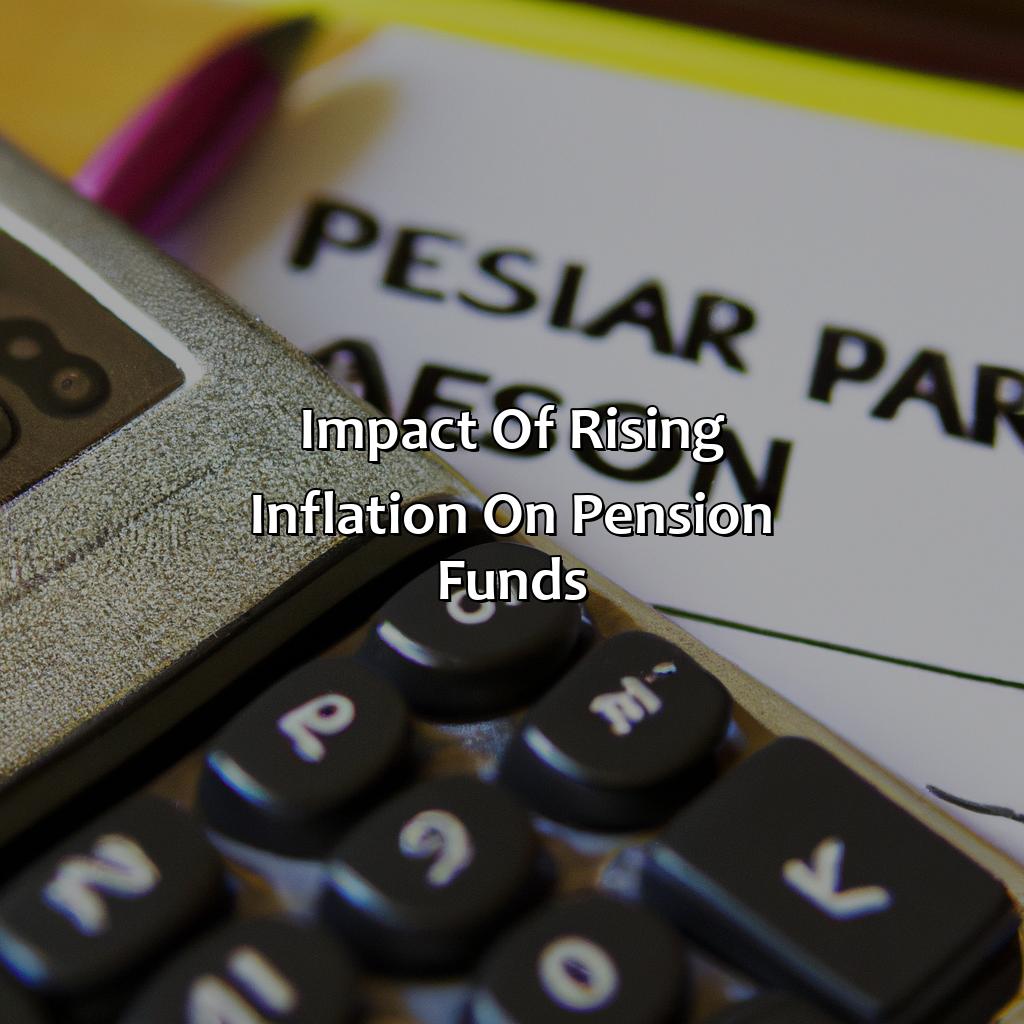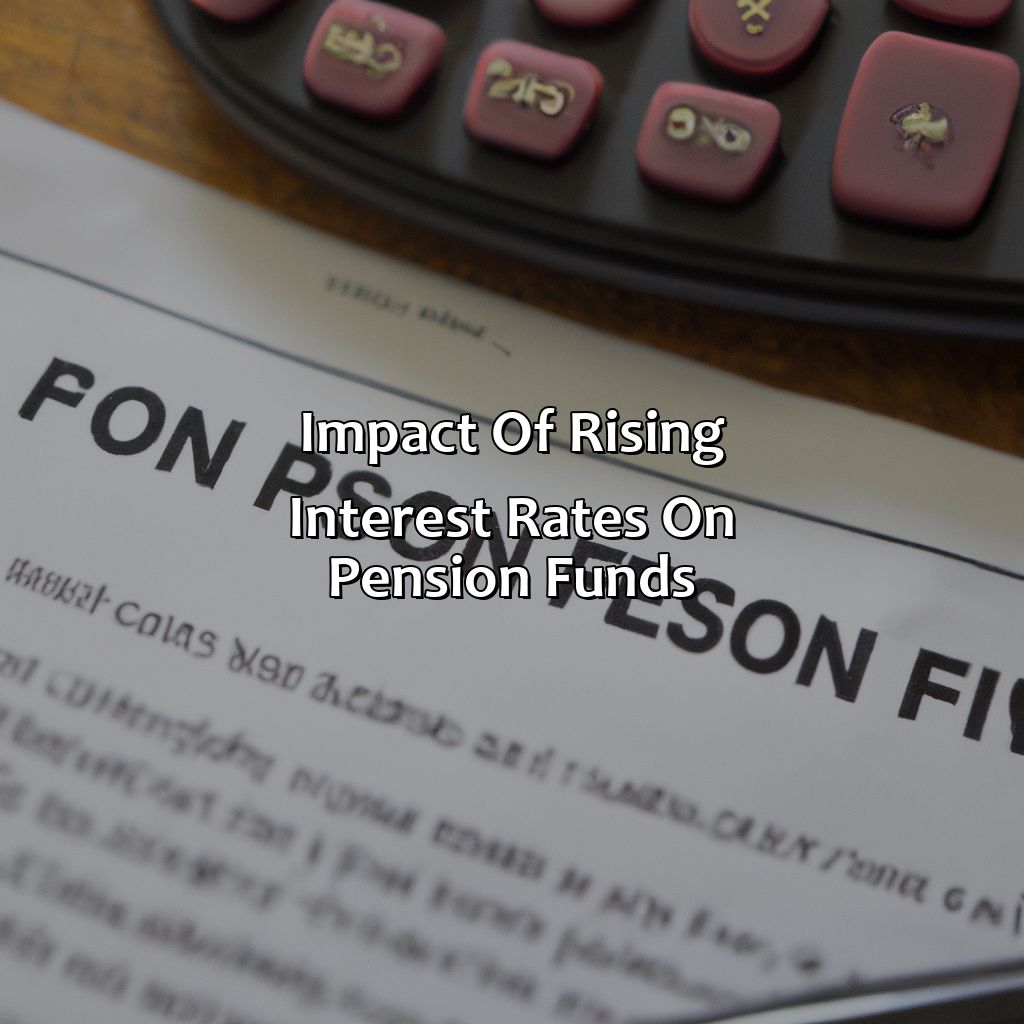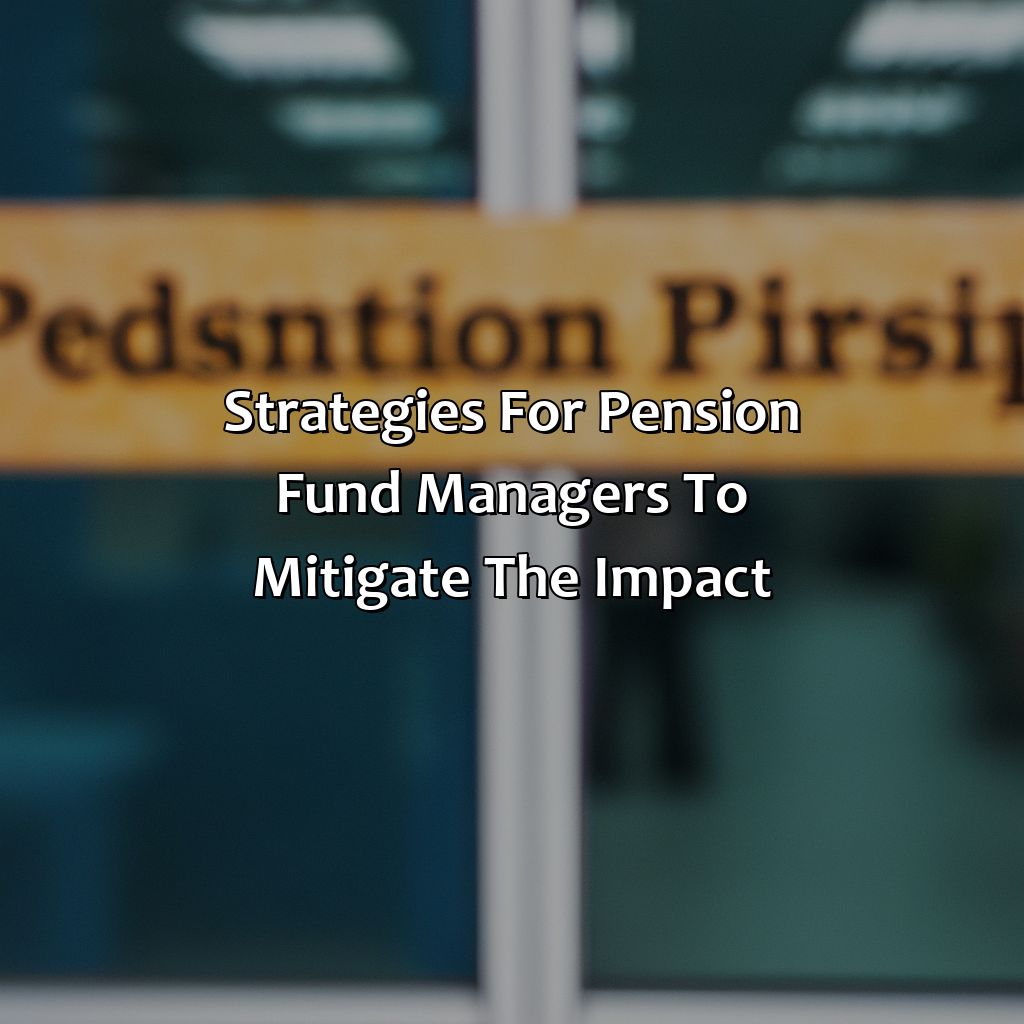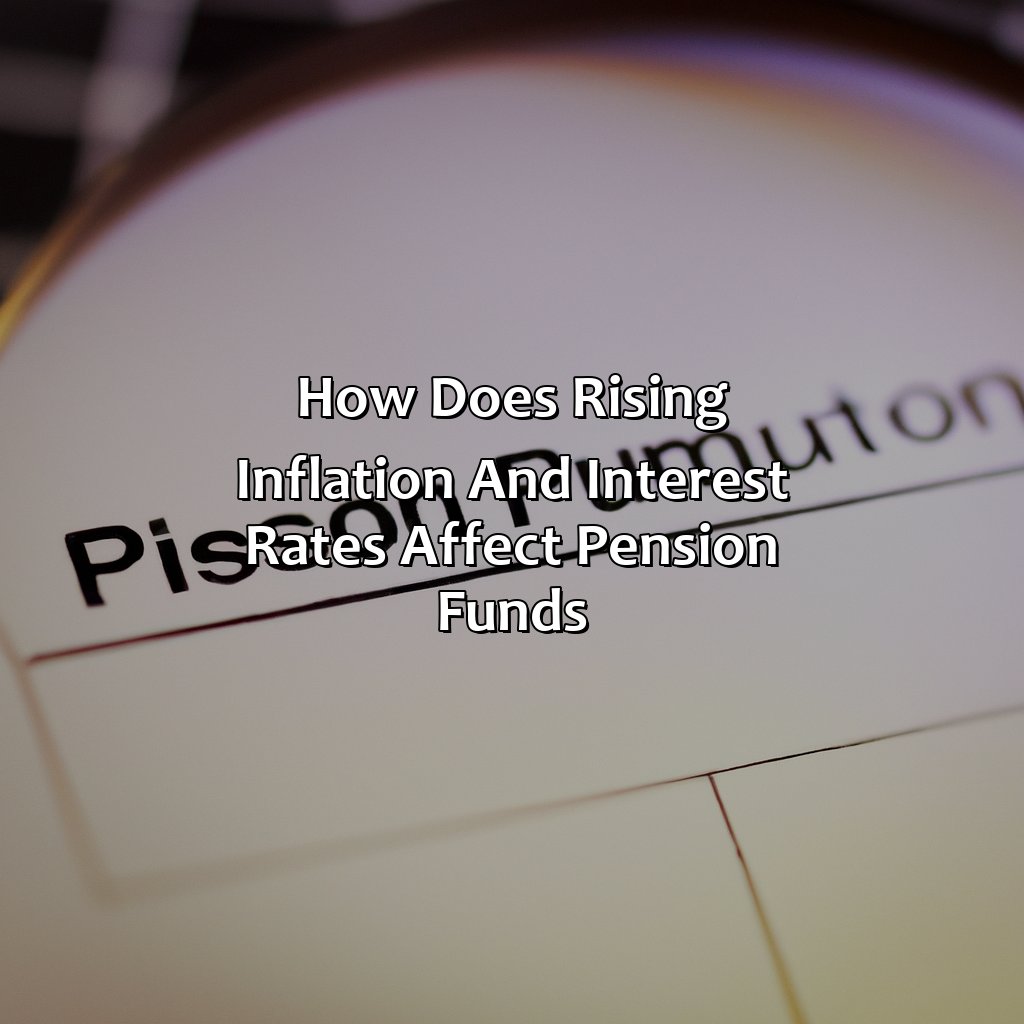How Does Rising Inflation And Interest Rates Affect Pension Funds?
Key Takeaways:
- Rising inflation and interest rates have a significant impact on pension funds. Pension funds may experience a decrease in their purchasing power and an increase in the cost of living for pensioners, resulting in financial challenges for these individuals.
- Rising interest rates can also negatively affect pension funds by causing a decrease in bond and stock prices. As a result, pension fund managers need to create strategies to mitigate the impact of rising inflation and interest rates, such as investing in inflation-protected securities and diversifying investments.
- Pension fund managers must consider these financial challenges when developing investment strategies to ensure that their funds can continue to meet the needs of retirees and pensioners over the long term.
Are you concerned about the future of your pension fund? Rising inflation and interest rates can have a major impact on the health of your retirement savings. Find out what you need to know to protect your finances and ensure a happy retirement.
Impact of rising inflation on pension funds
Inflation’s effect on pension funds can be significant. It reduces the purchasing power of pensioners and raises the cost of living. To comprehend the wider implications, look at these critical sub-sections. They can help you understand what inflation and interest rates mean for pensions.

Image credits: retiregenz.com by Joel Duncun
Decrease in purchasing power of pension funds
The current status quo has led to a decrease in the purchasing power of pension funds. With rising inflation and interest rates influencing the economy, various factors contribute to the reduction in the value of a pension fund’s assets over time. This means that retirees receive lower returns, affecting their standard of living significantly. In addition, increasing life expectancies lead to more extended periods where payouts occur, further exacerbating the issue.
Moreover, a decline in real returns affects both defined benefit and defined contribution plans differently. The former guarantees specific benefits regardless of market performance, which makes it challenging for plan sponsors to meet retirement obligations when investments underperform. Meanwhile, those with defined contribution schemes often have no guaranteed payout amounts but face increased risk if they must depend entirely on fluctuating financial markets.
It is noteworthy that despite their sizeable asset pools and long-term investment outlooks, even large pension funds can feel a considerable impact during prolonged inflationary periods. For instance, during the 1970s stagflation episode in America, pensions faced significant difficulties due to high oil prices and rapidly rising consumer costs.
In summary, we see how inflation and interest rate changes affect a retiree’s ability to maintain their standard of living over time. The details discussed reveal some of the complexities involved in managing large pension funds or meeting retirement obligations while protecting plan beneficiaries against market volatility.
Pensioners are feeling the squeeze as the cost of living rises faster than a retiree chasing a runaway pensioner bus.
Increase in cost of living for pensioners
Pensioners experience a rise in their cost of living due to inflation and interest rates. As costs such as housing, healthcare and food prices increase, those living on a fixed pension income find it challenging to maintain their standard of living.
This can have a significant effect on pension funds as they struggle to keep up with the rising cost of living for their members. The funds may have less money available for investments or to pay out benefits, resulting in lower returns for retirees.
Additionally, pension funds may need to adjust their investment strategies to include more assets that are not affected negatively by inflation or interest rates, such as real estate investment trusts (REITs) or inflation-protected bonds.
It is important to note that the impact of inflation and interest rates varies depending on the country’s economy. For example, during the 1970s inflation crisis in the US, many pension funds suffered severe losses.
Inflation and interest rates are like the bad twin siblings who make life difficult for pension funds, taking away their candy and throwing monopoly money in return.
Impact of rising interest rates on pension funds
To grasp the effect of growing interest rates on pension funds, we must think about bond prices and stock prices dropping. These sub-sections are major for recognizing the wellbeing of pension funds.

Image credits: retiregenz.com by Harry Washington
Decrease in bond prices
The rise in interest rates can lead to a decrease in bond prices. This is because investors demand higher yields to compensate for the increased risk of inflation. As bond yields increase, bond prices fall.
This decrease in bond prices can negatively impact pension funds that hold a significant portion of their assets in fixed-income investments like bonds. The decrease in bond prices can lead to losses in the value of pension fund portfolios, ultimately reducing their ability to pay out retirement benefits. To understand better how interest rates affect pension plans, it is crucial to examine the bond market.
In addition, rising interest rates may also lead to an increase in corporate borrowing costs, which could have an adverse effect on equity markets. This could further exacerbate losses for pension funds that hold equities in their portfolios.
It is important for pension fund managers to actively monitor and manage their investment portfolios amidst rising interest rates and inflation. This may require adjusting the asset allocation of their portfolios or diversifying their investments across various asset classes. To understand how interest rates affect lump sum pension, it is also important to consider factors such as life expectancy, inflation, and investment performance.
A real-life example of this occurred during the 2013 “taper tantrum” when U.S. Treasury yields surged and caused a wave of selling in fixed-income securities. Many pension funds experienced significant losses during this time due to heavy investments in bonds and other fixed-income assets.
Looks like my retirement plan just went from ‘travel the world’ to ‘world’s largest ball of yarn tour’ thanks to these plummeting stock prices.
Decrease in stock prices
During a period of rising interest rates, an event known to hamper with the financial stability; deterioration in the stock prices is a natural outcome. A fall in the value of shares would logically lead to reduced returns from pension funds investments.
Consequently, the implications for employees and pensioners will be disastrous, leading to incompetent performances in pension portfolio management and a decline in benefit payouts. Pension funds may struggle to fulfill their liabilities as the value of their investment portfolios dissipate.
It’s essential that pension fund trustees prepare comprehensive risk assessment plans that cover changing financial scenarios during periods marked by high inflation and rising interest rates. The pension fund managers should reassess and redesign their investment approach regularly, focusing on low-yielding but stable investments that aren’t drastically impacted by market fluctuations.
Pro Tip: It’s vital to remain conscious of market changes and adapt accordingly, consistently making alterations designed to protect one’s portfolio against market downturns during such fickle economic conditions.
Let’s hope pension fund managers have more than just a retirement plan in mind to tackle rising interest rates and inflation.
Strategies for pension fund managers to mitigate the impact
Rising inflation & interest rates can affect pension funds. So, to counter this, pension fund managers can use strategies. Invest in inflation-protected securities & diversify investments. This can help protect the funds from changing financial conditions.

Image credits: retiregenz.com by David Woodhock
Investing in inflation-protected securities
Protecting pension funds against rising inflation and interest rates is critical for managers. One method they can use is investing in securities designed to protect against inflation. These types of securities are known as TIPS, which stands for Treasury Inflation-Protected Securities.
TIPS provide investors with an inflation-adjusted return, protecting their investments from being eroded by rising prices. The U.S government issues TIPS that have a fixed interest rate but adjust the principal amount based on changes in the Consumer Price Index. This means that when inflation rises, the principal value of the security increases as well.
In addition to TIPS, investors can also consider investing in commodities like gold or energy, which tend to hold their value well during periods of inflation. However, it’s important to remember that these investments can be volatile and should only represent a small portion of a pension fund’s overall portfolio.
Managers can also consider using derivatives such as interest rate swaps or options to hedge against rising interest rates. These financial instruments provide a way for investors to lock in a fixed rate of return even if market interest rates increase. However, these strategies involve complex financial arrangements and may not be suitable for all pension funds.
Overall, investing in inflation-protected securities is one way for pension fund managers to mitigate the impact of rising inflation and interest rates on their investment portfolios. By diversifying asset classes and using effective hedging strategies, managers can help ensure the long-term sustainability of their funds.
“Don’t put all your eggs in one basket, unless you have a really good omelette recipe.”
Diversifying investments
Allocating resources wisely to reduce risks is essential for pension fund managers. Utilizing a variety of investment approaches can diversify investments, reducing the impact of market changes.
Diversifying Investments can involve investing in multiple asset classes, including stocks, bonds, and real estate. This strategy provides protection against sudden price shifts in a single asset class, minimizing losses.
Pension fund managers must also consider alternative investments such as private equity or hedge funds. These assets offer unique benefits such as potential higher returns and low correlation with traditional investments.
Employing a blend of strategies like asset allocation and active management can help pension funds manage risk exposure while pursuing their financial goals. However, it’s critical for managers to identify the right mix of investment options to ensure an optimal portfolio for their clients’ specific needs.
Five Facts About How Rising Inflation and Interest Rates Affect Pension Funds:
- ✅ Rising inflation can reduce the real value of pension funds over time. (Source: The Balance)
- ✅ High interest rates can increase the cost of borrowing for companies, which can lower corporate profits and thus reduce pension fund returns. (Source: Investopedia)
- ✅ Pension funds invest in a wide variety of assets, so the impact of rising inflation and interest rates can vary depending on the specific investments. (Source: Forbes)
- ✅ Pension funds with longer time horizons may be less affected by short-term fluctuations in inflation and interest rates. (Source: Pension Research Council)
- ✅ The impact of rising inflation and interest rates on pension funds can be mitigated through diversification and effective risk management strategies. (Source: National Institute on Retirement Security)
FAQs about How Does Rising Inflation And Interest Rates Affect Pension Funds?
How does rising inflation affect pension funds?
Rising inflation can have a negative impact on pension funds as it decreases the purchasing power of the funds. The real value of the pension fund decreases as the cost of living increases, resulting in a lower pension income for retirees. This decrease in value may lead to reduced benefits for members or an increase in the required contributions.
How do rising interest rates affect pension funds?
Higher interest rates can lead to an increase in the value of the pension fund’s fixed income investments. However, this effect is typically modest as most pension funds have diversified portfolios. Rising interest rates can also lead to an increase in the discount rate used to calculate the present value of future pension payments, which can reduce the fund’s liabilities and improve its funding status.
What is the relationship between inflation and interest rates on pension funds?
Inflation and interest rates are closely related. As interest rates rise, inflation tends to increase. Higher inflation can lead to a lower real value of the pension fund, as discussed earlier, and higher interest rates can lead to increased investment returns but lower bond prices. There is therefore no straightforward relationship between inflation and interest rates on pension funds.
Can pension funds benefit from rising inflation and interest rates?
While higher interest rates can result in higher investment returns, they also increase the discount rate used to calculate pension liabilities. The impact of rising inflation on pension funds is generally negative. Therefore, despite the possibility of higher investment returns, the overall benefit of higher inflation and interest rates on pension funds is limited.
How can pension funds protect themselves from the negative effects of rising inflation and interest rates?
Pension funds can hedge against inflation by investing in inflation-protected securities or by using inflation derivatives. Funds can also diversify their portfolio to reduce the impact of interest rate changes. Additionally, ensuring that the fund is fully funded and implementing a risk management strategy can help mitigate potential negative effects.
What should pension fund members do in response to rising inflation and interest rates?
Pension fund members should monitor their fund’s performance and funding status, and consider increasing their contributions if necessary. Members may also wish to seek advice from financial professionals to determine the best course of action for their particular situation. It is important to be proactive and make adjustments early to avoid any negative impacts on retirement income.
